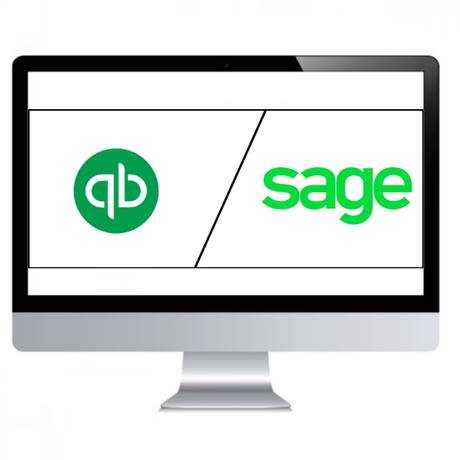
Are you confused about which accounting software to choose for your business? With so many options available, it can be overwhelming to decide. Two popular choices are QuickBooks and Sage. Both offer various features that cater to the needs of different businesses, making it challenging to determine which one is suitable for yours. In this blog post, we will compare QuickBooks vs Sage and provide insights into their pros and cons. By the end of this article, you will have a clearer understanding of which software aligns with your business requirements. So let's dive in!
Comparing QuickBooks vs Sage
QuickBooks and Sage are two best accounting software that offer similar features but have some fundamental differences between QuickBooks vs Sage. QuickBooks is a cloud-based solution designed for small businesses, while Sage offers both cloud-based and on-premise solutions that cater to the needs of larger companies.
QuickBooks has an intuitive user interface with easy navigation, making it simple to use even for beginners. It also offers several plans tailored to the specific requirements of different business types, including freelancers, startups, and established companies. Additionally, QuickBooks provides a range of tools such as invoicing and expense tracking that help streamline financial management processes.
On the other hand, Sage's robust functionality makes it ideal for medium-sized businesses with complex accounting requirements. It offers advanced features like project management capabilities, inventory tracking options in addition to standard bookkeeping functions.
In terms of pricing structures - while QuickBooks offers affordable monthly subscription fees based on usage levels; however, Sage can be more expensive due to its additional functionalities.
Both QuickBooks vs Sage offer unique benefits depending on your business needs thus when comparing between these two programs consider which one aligns better with your organization's size, budget, and complexity level.
QuickBooks Overview
QuickBooks is a popular accounting software that has been around for over 30 years. It was developed by Intuit and is marketed towards small to medium-sized businesses. The software offers a range of features, including invoicing, payroll processing, inventory tracking, and more.
One of the major advantages of QuickBooks is its user-friendly interface. The software is easy to navigate and can be customized to suit the needs of your business. It also integrates with other commonly used tools such as Microsoft Excel and Outlook.
Another benefit of QuickBooks is its affordability. There are several pricing plans available depending on the size and needs of your business. Additionally, QuickBooks offers cloud-based solutions which provide remote access to data from anywhere at any time.
QuickBooks also offers strong reporting capabilities allowing you to create reports based on various financial metrics such as income statements or balance sheets. These reports can help you track expenses, identify trends in sales data while making informed decisions about your business's finances.
QuickBooks’ ease-of-use combined with affordable pricing makes it an excellent choice for small businesses looking for reliable accounting software that provides essential features like invoicing and expense tracking while being adaptable enough to grow with their company’s changing needs over time.
Sage Overview
Sage is a business management software that offers multiple solutions for various industries. It was created in the UK and has since expanded to become a global company with offices all over the world.
One of Sage's main strengths is its flexibility, which allows users to customize their experience based on their specific needs. The software offers different modules such as accounting, payroll, HR, CRM, inventory management and more.
Sage also provides cloud-based solutions that allow users to access their data from anywhere at any time. This feature improves collaboration between team members who can work together remotely.
Another notable aspect of Sage is its security measures. The software uses advanced encryption methods to secure user data against unauthorized access or breaches.
However, some users have found Sage's interface less intuitive compared to QuickBooks'. Nevertheless, this may vary depending on individual preferences and prior experience using similar tools.
Sage remains a popular choice among businesses due to its customization options and robust features designed for managing complex operations efficiently.
QuickBooks vs Sage: The Pros and Cons
QuickBooks and Sage are two of the most popular accounting software choices for businesses. However, QuickBooks vs Sage have different features that cater to specific business needs. Let's take a look at some of their pros and cons.
QuickBooks is user-friendly, intuitive, and easy to learn. It also has an extensive library of third-party integrations that can extend its functionality. QuickBooks offers four pricing plans, including a free version for freelancers.
On the other hand, Sage provides more advanced features like inventory management, project management tools, and multi-currency support. It also offers flexible customization options tailored to your business needs. However, it requires more training time due to its complex interface.
One downside of QuickBooks is that it has limited users' permissions settings which can be problematic in larger organizations with many employees who need access to specific parts of the system. While Sage may offer advanced features but comes at a higher cost than QuickBooks.
Ultimately choosing between QuickBooks vs Sage depends on what your company's needs are- if you're looking for ease-of-use or advanced capabilities then either option might be better suited towards meeting those goals!
Which One is Right for Your Business?
When it comes to choosing between QuickBooks and Sage for your business needs, there are a few factors that should be considered. First, think about the size of your business and its specific accounting needs.
For small businesses with simple accounting requirements, QuickBooks may be the better option as it is more user-friendly and less expensive than Sage. However, if you have a larger company or complex accounting needs then Sage might be more suitable.
Another important thing to consider is the type of industry your business operates in. For example, service-based businesses like consulting firms may find QuickBooks sufficient while manufacturing companies with inventory management needs may benefit from Sage's advanced features.
It's crucial to evaluate what kind of support and training will be available for each software option before making a final decision. Make sure you choose software that can provide adequate customer support during installation process and ongoing usage.
Both QuickBooks and Sage have their own strengths and weaknesses which make them well suited for different types of businesses. By carefully evaluating your company’s unique situation against these factors above, you can determine which one is right for you!
Conclusion
After comparing QuickBooks vs Sage, it's clear to see that both accounting software programs have their own strengths and weaknesses.
QuickBooks is great for small to medium-sized businesses who need a user-friendly interface with robust features like invoicing, inventory management, and payroll processing. On the other hand, Sage offers more extensive customization options that cater to larger companies with complex accounting needs.
When choosing between QuickBooks vs Sage, it's important to consider your business size and specific requirements carefully. Choose the one that suits your company’s unique financial situation best.
Both solutions offer free trials so you can try before buying. So take advantage of this opportunity by trying out both software options before making a final decision on which one works best for you.
Investing in either QuickBooks or Sage will be an excellent step towards streamlining your business finance operations. With these two top-notch software systems at your disposal, managing finances has never been easier!

